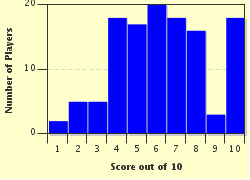Quiz Answer Key and Fun Facts
1. One of the most popular washing up liquids in the 60s had a very relevant name, but how did they spell it?
2. Which cleaning product is advertised by an airline pilot?
3. Which product cleans 'like a white tornado'?
4. Always found in our bathroom, what best describes what was contained in the pale blue bottle of Stergene?
5. Which of these washing powders is no longer on sale in Britain in 2013?
6. Which washing powder means 'parsley' in a different language by coincidence?
7. Which of these clothes washing products is the odd one out?
8. Which of these products would not normally go down a toilet?
9. Which was the first biological washing powder?
10. Which of these companies does not manufacture household cleaning products?
Source: Author
satguru
This quiz was reviewed by FunTrivia editor
WesleyCrusher before going online.
Any errors found in FunTrivia content are routinely corrected through our feedback system.


